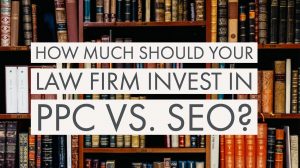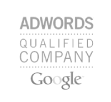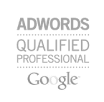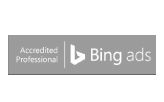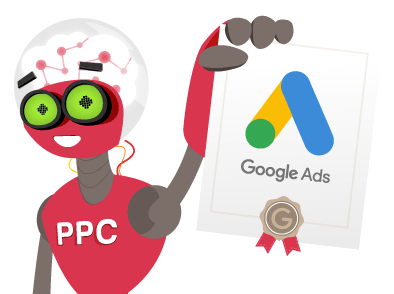Google Ads (formerly known as Google Adwords) has become one of the most popular forms of digital marketing. While other marketing channels use a flat fee for advertising, Google Ads uses pay-per-click advertising (PPC), meaning you’ll be charged only when someone clicks your ad.
The fluctuating cost of PPC advertising leaves many marketing professionals unsure of how much to spend on Google Ads. In this guide, we’ll break down how to set a Google Ads budget that fits your business’ needs.
The Short Answer: It Depends on Your Business Size, Type, and Digital Marketing Budget
The question of how much to spend on Google Ads does not have an easy answer. The short answer is: it varies. To understand how to set a Google Ads budget, you first need to know how Google determines your ad costs.
Google uses an auction marketplace to determine your cost-per-click (CPC). In this complex system, advertisers bid on relevant keywords in order for their ads to appear on a Google search results page. Several variables affect the cost of Google Ads, including:
Search Volume and Keyword Competitiveness: for example, during the holiday shopping season, many keywords see an increase in traffic and become more competitive, resulting in a higher CPC
Search Volume and Keyword Competitiveness: for example, during the holiday shopping season, many keywords see an increase in traffic and become more competitive, resulting in a higher CPC
- Industry: keywords relating to business services (legal, real estate, accounting, etc.) are highly competitive and come at a higher CPC than, say, retail or hospitality.
- Current Trends: for example, the COVID-19 pandemic shifted consumer behaviors and online shopping habits
- Quality Score: Google’s metric for rating the quality and relevance of your keywords and PPC ads
- Search Volume and Keyword Competitiveness: for example, during the holiday shopping season, many keywords see an increase in traffic and become more competitive, resulting in a higher CPC
How much you should spend on Google Ads depends on your business's size and type, its digital marketing strategy, sales goals, and overall marketing budget. Ask yourself what you’re trying to achieve through your marketing efforts. Are you looking to add new qualified leads to your marketing funnel or simply increase sales volume and revenue?
How Much Should I Budget for Google Ads?
Your Google Ads budget depends on a myriad of things, so there’s no specific dollar amount that’s the ideal budget. Many digital marketing experts recommend that small to medium-sized businesses spend at least $500-$10,000 per month on PPC advertising.
Remember, the more you spend, the more traffic you attract to your site, and the more conversions you’re likely to get. As long as your campaign is profitable, you shouldn’t put a cap on your spending. Let’s examine a few key factors in determining your PPC advertising budget with Google Ads:
Use a Test Budget to Understand Your Actual Cost
As we said before, there’s no one-size-fits-all answer to how much Google advertising costs. When setting your maximum daily and monthly spend on Google Ads, consider your overall marketing budget and how much you can realistically spend.
Instead of budgeting based on the estimated CPC for your chosen keywords (which can be found on Google Keyword Planner), focus on your actual cost. Your actual cost-per-click is the final amount you’re charged for each click on one of your ads. If your margins can’t cover the actual cost required for competitive advertising, PPC isn’t going to work.
If you’re unsure how much to spend on PPC marketing, it can be extremely beneficial to start with a test budget to gauge your actual advertising costs. While this initial testing may not be profitable from the get-go, you’ll gain valuable insights into what keywords produce the most qualified leads and what ad copy resonates with your target audience.
Keep Track of Your Conversion Rate or Earn-Per-Click (EPC)
A common mistake marketers make is focusing solely on getting the lowest CPC. While improving your Google Ads Quality Score and writing enticing copy can help get lower-cost clicks, CPC is not the only metric you should be monitoring. It’s equally important to look at your conversion rate— better known as earn-per-click (EPC).
EPC is calculated by multiplying your conversion rate (the percentage of users who click your ad and become paying customers) by customer value (the average amount you earn, minus costs, from each new customer). For example, if your average customer value is $100, and your conversion rate is 2%, then your EPC on Google Ads is $2.
This means that keywords with a CPC under $2 will be profitable advertising for your business. Instead of focusing on attracting high volumes of clicks on keywords with the lowest CPC, find keywords with a high conversion rate that maximizes your EPC.
Pinpoint Your Target Audience
When paying per click, you’ll want to ensure your marketing budget is spent on clicks with the highest chances of converting to paying customers. Pinpointing a target audience of highly-qualified leads ensures your marketing budget is spent effectively.
Google Ads offers advanced audience targeting that, when used correctly, can significantly increase the effectiveness of your ads. Advertisers can adjust their budget to bid higher on more qualified leads and reduce bids on those who are less likely to convert.
Because of Google’s sophisticated segmentation capabilities, the more specific your target audience is, the better. Here are some key criteria to consider:
- Location
- Time (inc. both day of the week and time of day)
- Device type
- Interests and habits
- Age
- Gender
Remember, if you’re just getting started with Google Ads, it may take a bit of time to find the right strategy. Keep in mind that Google Ads is an investment in your business, not just a marketing expense. By monitoring your campaigns' results, you can gain valuable insights into lead generation and customer conversions.

